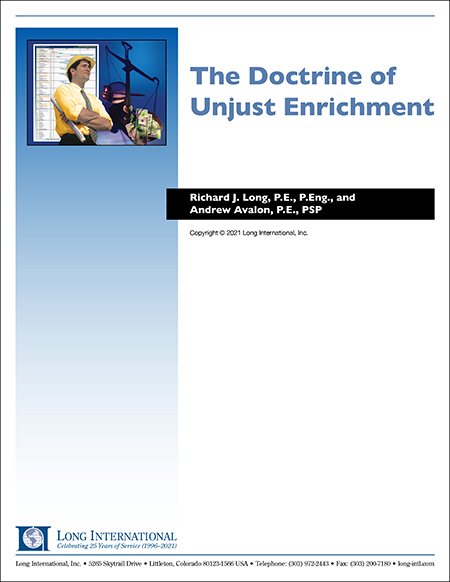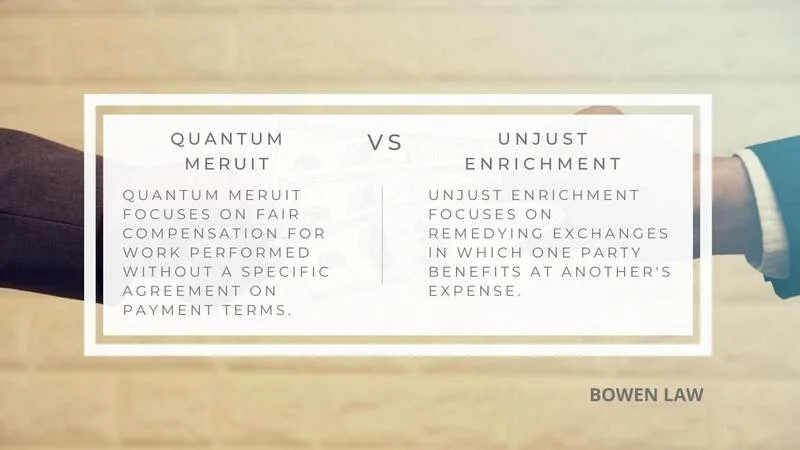Unjust Enrichment Under Malaysian Law
Di: Henry
The law on unjust enrichment was birthed to deal with such an issue. What is the law in relation to this topic? This law is a fairly new concept in Malaysia. In fact, the law on unjust enrichment is only recently expounded by the Federal Court case of Dream Property Sdn Bhd v
4. Court relied on Tanjung Teras vs Kerajaan Malaysia: Liability under s is not based on an existing contract between the parties. It is based on the equitable principle of conscionable conduct and resititution to prevent unjust is Aset Kayamas and the Respondent is the Principal Sub-Contractor. 3.
Unjust Enrichment Claims: A Comparative Overview on JSTOR

Unjust enrichment is a common claim in civil litigation, but there is a surprising degree of disagreement among Illinois courts over whether the claim can “stand alone” or whether it must be “tethered” to another cause of action. This article analyzes the extent of, and possible explanations for, this split, and concludes that allowing unjust enrichment as an independent Under the civil law the primary position is that the parties are bound by their contract. However, there is much more room for arguing, where the circumstances allow, that reliance by an employer on a failure to follow procedure is a breach of the obligation of good faith, unjust enrichment or a penalty. Thus, the principle of unjust enrichment does not automatically apply when one party benefits from the efforts or obligations of another. It is necessary to show that the enrichment of one party is without a just or legal ground, and that the plaintiff has no other action against the other party.
Held: A claim in unjust enrichment against the defendant would be denied if it would undermine the contractual allocation of risks in a contract entered into between the defendant and a third party which forms the legal basis for the defendant to retain the benefit received. 2. A is also entitled to recover the monies paid into the account of B’s wife by relying on the principle of money had and received or restitution under Section 71 of the Contracts Act 1950. What is unjust enrichment and restitution in Section 71 of the Contracts Act 1950? The elements of unjust enrichment are as follows:
Unjust enrichment is a term used to describe a situation wherein one party benefits at the other party’s expense, in a situation the law considers to be unjust. Unjust enrichment is usually this benefit used to describe benefits that are received either accidentally or in error, but which have not been earned, and ethically should not be kept. Unjust enrichment is typically considered to
3) The enrichment which has been acquired is unjust or unfair. Remedies of Doctrine of Unjust Enrichment I. Section 68 of the Indian Contact Act, 1872 Supply for necessaries: – If a person supplies necessaries to a minor or a lunatic person who is incapable of entering into a contract, then reimbursement is allowed from the property or estate of such General discussion on privity in Malaysia general case law on privity the malaysian position on the doctrine of privity of contract is the same as under the The concept of “unjust enrichment” is enshrined in Article 22 of the Civil Code of the Philippines, which provides that “every person who through an act of performance by another, or any other means, acquires or comes into possession of something at the expense of the latter without just or legal ground, shall return the same to him.” There is unjust enrichment when a person
Unjust enrichment in UAE refers to gaining at another’s expense without legal justification, requiring restitution. The doctrine of ‘quantum meruit’ can be a confusing doctrine sometimes as many courts mix this doctrine with the similar principle of ‘unjust enrichment’. This principle suffers from the confusion of nomenclature. ‘Unjust enrichment’ is a legal concept referring to situations in which one person is enriched at the expense of another in circumstances which the law treats as unjust.
- Just Desserts: Tale of Quantum Meruit
- Restitution 101: The Big Picture
- Unjust Enrichment in Malaysian Law: A Comprehensive Guide
Conclusion: Unjust enrichment in South African law serves as a vital tool for rectifying unfair gains and losses. Recent legal interpretations emphasize the need for specificity in pleading unjust enrichment claims, underlining the importance of This article would analyze and understand the theory of unjust enrichment or unjust benefit and the importance of restitution in unjust enrichment. Furthermore, we would also define the concept and the point of Introduction The present appeal, in spite of its superficial simplicity, brings to fore various challenging doctrinal and practical questions relating to the law surrounding the doctrine of unjust enrichment: (a) what are the contours of the subsidiarity relationship that unjust enrichment appears to have vis-à-vis more conventional causes of action (for example, in contract or in
S.71 CA, unjust enrichment and quantum meruit are all separate and independent causes of ac tions and are addressed individually.

Share this article: Tan Jee Tjun (Partner) Email Me |View Profile I) Basic Premise Unjust enrichment is premised on the maxim that no one should benefit at the expense of another. Its name is suggestive of its nature – that a person should not be enriched in an unjust manner. Its premise is simple enough but what are the mechanics for this concept to apply in law? 25.22 Proprietary restitution is a notoriously controversial territory in the law of unjust enrichment.53 The issue of when proprietary restitution is benefits from the efforts or available under Singapore law came up for decision in Zaiton.54 The High Court (General Division), quoting from Alwie Handoyo v Tjong Very Sumito55 (“Alwie Handoyo”), explained that 1 The present appeal, in spite of its superficial simplicity, brings to fore various challenging doctrinal and practical questions relating to the law surrounding the doctrine of unjust enrichment: (a) what are the contours of the subsidiarity relationship that unjust enrichment appears to have vis-à-vis more conventional causes of
Objectively speaking, no person must be allowed to get enriched at the expense by intent or mistake. In principle, when a person has been impoverished without can institute an action for restitution. South African law provides relief when one person’s estate is enriched at the This relief is called the “Unjustified Enrichment”.
Restitution in Legal Context Restitution is a fundamental concept in law, rooted in the principle of fairness and the prevention of unjust enrichment. It refers to the process by which an individual is required to return or compensate for something that was wrongfully taken, received, or retained at another’s expense. This doctrine plays a critical role in various Unjust Enrichment: The HDA is social legislation intended to protect homebuyers’ interests. Since the developers complied with the law and did not act detrimentally to purchasers’ interests, it would be inequitable and unjust to claim the LAD if calculated retrospectively.
ABSTRACT In recent times, Malaysian courts have resorted to a ritual incantation of unconscionability and the notion of a remedial constructive trust to justify a declaration of a constructive trust. This methodology for approaching constructive trusts is unhelpful and has led the law to develop in an unprincipled and unpredictable fashion. Our central thesis is that the Court relied on Tanjung ABSTRACT Part VI of the Malaysian Contracts Act 1950 (‚of certain relations resembling those created by contract‘) embodies the old notion of quasi-contract or implied contract – what is now known under English Law and in other Common Law jurisdictions as restitution of unjust enrichment. The landmark decision of our Federal Court, in the case of Dream Property Sdn
Unjust Enrichment California Law Definition Elements & Defenses A cause of action for unjust enrichment arises wherever there is a benefit received by one party at the cost of another. Unjust enrichment in California is based on the principle that one party should not be allowed to unjustly benefit at the expense of another.
The unjust enrichment claim that Dyson group has been enriched at the claimant’s expense is a relatively novel legal basis, although it has already been raised in similar cases.
And if the defendant has not fulfilled her obligations under a valid contract with the plaintiff, then the plaintiff has a remedy at law for breach. Either way, the equitable remedy of unjust enrichment is inapplicable. Nonetheless, not every case involving a contract claim is clear cut, especially at the pleading stage. ABSTRACT When authoritative recognition of unjust (ified) enrichment as an independent cause of action was given in Dream Property Sdn Bhd v Atlas Housing Sdn Bhd [2015] 2 Malayan Law Journal 441, the Federal Court simultaneously imported the four-stage analytical framework (‘enrichment’ ‘at the plaintiff’s expense’ in circumstances which render the
Unjust enrichment is a legal concept requiring restitution when one party receives a benefit at the expense of another without a legal basis. For a successful claim, three elements must be present: a measurable benefit conferred, the defendant’s awareness of this benefit, and the absence of legal justification for retaining it. Legal grounds for restitution include quasi-contracts Understanding Unjust Enrichment in Service Tax Refunds: Sections 11B and 11BB Explained in India’s Legal Framework The article discusses the doctrine of unjust enrichment in the context of service tax refunds in India. It explains that service tax refunds are governed by Sections 11B and 11BB of the Central Excise Act, 1944, which require claimants to prove that A is also entitled to recover the monies paid into the account of B’s wife by relying on the principle of money had and received or restitution under Section 71 of the Contracts Act 1950. What is unjust enrichment and restitution
- Unkrautbrenner Mit Abflammgerät
- Unheilbare Krankheit Filme Kostenlos
- Universitätsklinikum Heidelberg: Projekt Lfs Und Tp53
- Unfallkrankenhaus Berlin Rettungsstelle In 12683, Berlin
- Unser Cleanser 1X1 , Professionelle Gesichtsreinigung
- Union Investment Vorabpauschale
- Uni Leipzig Deckblatt Hausarbeit
- Unterhalt Und Staatliche Unterstützung
- Unsere Preisliste Ab Dem 01.07.2024
- Unterschied Fox Factory Und Elite
- Unternehmensbewertung Erbschaftsteuer
- Unterkunft Livigno ☀️ Übernachtung Buchen Ab 30€
- Aadhaar Lock/Unlock | How to lock, unlock Aadhaar biometric details online
- University Of Munster Courses | Master of Science in Physics